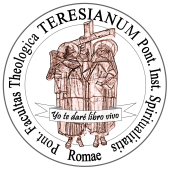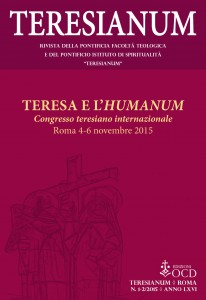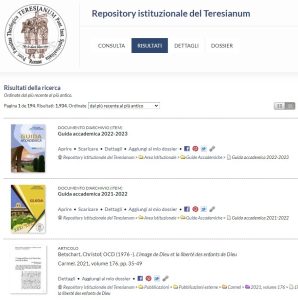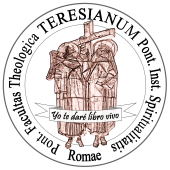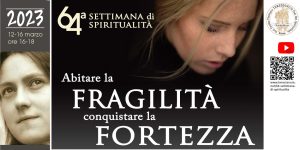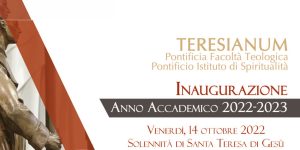- Presentation
- Curriculum di studio
- Piano di studio 2022-2023
- Orario delle lezioni
- Esami
- Tesi in corso
- Calendario delle difese
These norms came into effect at the beginning of the academic year 2015-2016, for students who began their doctorate in that year. Students who began their doctorate in previous years will follow the norms which had obtained prior to 2015-2016.
“In the third stage the candidate moves toward intellectual maturity through their work of research which will make a definite contribution to the progress of theological science.” (Statute, art. 83a; Veritatis Gaudium, art. 39c; 49 §2).
1. Admission to the Third Stage in Theological Anthropology
a) For admission to the Third Stage (in accord with what has been stipulated with regard to the First and Second Stages [cf. Statute, art. 47a; 70; 76]), the candidate will have attained a Licentiate in Sacred Theology in an Ecclesiastical University, with specialisation in Theological Anthropology. The candidate will have obtained a grade not lower than an average of 9/10, 27/30, or equivalent according to the scale employed by the said University (cf. Statute, art. 47a; 84a), and will have competence in two of the following languages: English, French, German, Spanish (cf. Statute, art. 47b; 84b). The examination proving competence in the first language will have taken place during the two years study for Licentiate; the examination for the second modern language will take place during the first year of doctoral studies.
b) “Candidates who have obtained the Licentiate in Theology in other specialisations can be admitted to doctoral studies, but must follow courses to the value of 36 credits (ECTS) during a year of assimilation” (Statute, art. 84c).
c) Registration must be renewed every year at the office of the General Secretary.
d) The candidate who attains a Doctorate in Theology at the Teresianum in one of the two specialisations – Spiritual Theology or Theological Anthropology – is not thereby entitled to be readmitted to the Third Stage in order to attain a Doctorate in the other specialisation.
2. Courses and Examinations
a) The doctoral student must participate in a seminar on methodology, and must pass the relevant examination (4 credits). Moreover, he or she will take part in other academic initiatives proposed by the Faculty (cf. Statute, art. 83b).
Students who lack sufficient competence in the Italian language may follow the material provided in the said seminar through tutorials conducted in another modern language (English, French, German, Spanish).
b) The prescribed length of Doctoral studies is from three to five years (cf. Statute, art. 83c). In the event of a suspension of studies following a justified request by the student, accepted by the Faculty, or in the event of a suspension imposed in accord with the Academic Code of Behaviour, the time allowed for the Doctoral studies may be prolonged by a maximum of two years in total. Beyond this length of time, the student’s registration will lapse and he or she will no longer be entitled to pursue the proposed topic of the thesis.
c) Financial contribution: there is an annual fee to be paid, except in the case of legitimate suspension. There are further fees to be paid on delivery of the Thesis and on request for admission to the final examination when the students defends the Thesis.
3. Examination Commission
a) The Examination Commission is appointed ad casum. The Moderator is chosen by the student from among the established Professors in the teaching body. The President will name the two Examiners of the Examination Commission, taking into account the view of the Commission for the suitability of the project.
b) The relevant Faculty Professors are appointed as Moderators with the written consent of the President, following the Doctoral student’s request.
c) Former professors who are no longer teaching (cf. Statute, art. 41) and Emeritus Professors (cf. Statute, art. 41b) may not be appointed to the Examination Commission ad casum. Emeritus Professors may complete their role as Moderator or Examiner assumed prior to their becoming Emeritus. For Emeritus Professors, the said role is subject to the approval of the Faculty Council and the written confirmation of the Chancellor (cf. Statute, art. 41b).
4. The Thesis Proposal
The Proposal for the Doctoral Thesis “must specify the area of research, the specific theme, details of publications and studies already in existence on the theme, the sources and subsidiary material to be employed, and the outline of the thesis as it is envisaged at this point in time” (Norms, 35b). The Proposal must manifest the originality of the proposed thesis and the exact area of research. It will be of some five pages in length, comprising both the presentation of the project and the essential bibliography. The Proposal will be signed by the Moderator whom the student has chosen (Norms, 35b). Seven copies of the Proposal will be delivered to the Secretary. The Proposal may be delivered only after two semesters of research, beginning from the original registration for Doctoral studies (unless exception has been made for a just cause).
The President appoints and convokes a Commission of two Professors, from within or indeed outside the Faculty, to decide on the admissibility of the proposed thesis.
5. Evaluation of the Proposal
The Commission ad casum which evaluates the suitability of the proposal will consist in the Moderator, the two Examiners, and the President. The Moderator will prepare a report presenting the decision of the Commission ad casum. This report will be delivered to the General Secretary, signed by each member of the Commission, with their suggestions regarding the student’s ensuing work on the thesis. The Secretary officially delivers the report to the three professors and to the student.
6. The role of the Commission ad casum in the course of work on the doctorate
a) As work on the doctoral thesis proceeds, the student will deliver two copies of his or her work to the Moderator for the Moderator’s review and observations.
b) It will be the duty of the Moderator to deliver to the first Examiner the text of the thesis, along with the observations and possible modifications required. The first Examiner will in turn communicate to the Moderator his or her own observations, and the Moderator will prepare an account of these observations and suggestions and deliver this personally to the student.
7. Evaluation of the Doctoral Thesis
a) The Doctoral Thesis may be between 200 and 500 typed pages, according to the methodological norms of the Faculty (available on the website).
b) Forty days prior to the defence, the thesis, signed by the Moderator, will be delivered by the student to the General Secretary. The student will deliver five typed copies (four copies printed on one side only of the page, and one copy printed front and back). The student will also send to the Secretary a digital copy in non-modifiable PDF format. The student must also at this time present to the General Secretary the Declaration of Originality of the Text, and of the conformity fo the PDF with the printed text. (The template for this is available on the Faculty website.)
c) The binding of theses in Theological Anthropology will be burgundy in colour.
d) Each member of the Examination Commission will write their assessment including the grade they would assign the thesis. These assessments will be delivered to the General Secretary. The student will receive the assessments but without the grades.
e) The three members of the Examination Commission, convoked by the Moderator, will come together to present to each other their assessments and to decide by common decision the grade to be assigned to the thesis (cf. Norms, 55b).
f) At the same meeting the Examination Commission will decide about the publication of the Doctoral Thesis and the possible modifications to be made for publication.
g) The Doctoral student will have twenty minutes to present his or her Thesis. Each member of the Examination Commission will also have twenty minutes. The defence will take place in Italian, (or in the relevant modern language, in the case of students whose study of the material for the Third Stage took place in tutorial form in English, French, Spanish or German).
h) Immediately after the defence and the discussion of the thesis, the Examination Commission and the President or his Delegate meet to agree the final grade. At this meeting the President or his Delegate are entitled to vote.
i) The final grade is given out of ten: 7/10 for the written thesis; 2/10 for the oral defence; 1/10 for the Doctorate course. The total constitutes the academic grade (cf. Norms, 46):
from 0.0 to 5.99: non probatus;
from 6.0 to 6.99: probatus;
from 7.0 to 7.99: bene probatus;
from 8.0 to 8.99: cum laude probatus;
from 9.0 to 9.69: magna cum laude probatus;
from 9.7 to 10: summa cum laude probatus.
8. Publication
a) Before publication, the student will deliver to the General Secretary the text to be printed, so that the Moderator and the first Examiner may give their Vidimus et approbavimus.
b) In order to obtain the title of Doctor in the relevant specialisation, part or all of the doctoral thesis must be published, having obtained for the same the imprimatur from the Diocese of Rome. Ten printed copies of the published text must be delivered to the Secretary General. A digital copy in non-modifiable PDF format must also be delivered, with the declaration of the conformity of the PDF with the printed text.
c) The published thesis must include: the general index; the index of the abstract where only a part of the thesis is published; the general introduction; the general conclusion; the bibliography.
d) The right of publication expires after ten years following the date of the defence.
Times of classes
The seminars for Doctoral Students take place on Monday morning, along with Doctoral Students of Spiritual Theology.
Ogni Dottorando è tenuto alla frequenza e al superamento della relativa prova d’esame di un seminario metodologico (4 ECTS). Inoltre, sarà tenuto a seguire altre iniziative accademiche previste dalla Facoltà.
Per gli studenti che non hanno padronanza della lingua italiana esiste la possibilità di seguire tali insegnamenti in modo tutoriale in una delle lingue moderne: inglese, francese, spagnolo e tedesco.
Seminari prescritti in comune con la specializzazione in Teologia Spirituale
| SAS2003 | Metodologia di lettura e analisi di testi religiosi e teologici Adrian Attard |
4 ECTS |
| SAS2004 | Metodologia della ricerca scientifica María de las Mercedes Montalvo García |
4 ECTS |
L’orario delle lezioni sarà pubblicato alcuni giorni prima dell’inizio dell’Anno Accademico.
Gli esami sono basati sugli elaborati scritti che devono essere consegnati in Segreteria Generale, secondo le scadenze stabilite dal Calendario dell’Anno Accademico, pubblicato sul sito della Facoltà e nella Guida Accademica 2022-2023.
| Inizio | Nome dello Studente | Titolo della Dissertazione |
| 31/01/2019 |
Cyriac THONIKUZHIYIL |
Man as a Free Being Called to Communion. A Relational Understanding of Christian Freedom According to Gaudium et Spes |
| 12/02/2018 |
Martin DANIŠEK |
Persona umana-desiderante. Struttura del desiderio nell’approccio psicoanalitico di Jaques Lacan nell’autobiografia di Teresa d’Avila |
| 19/05/2016 |
Charbel EL NADAF |
La risonanza musicale nella relazione di equivalenza fra Dio, uomo, mondo |
| 20/01/2014 |
Daniel MARTINAS |
L’uomo, tra progetto divino e decisione personale. Incontro e differenziazione tra l’antropologia filosofica di Max Scheler e l’antropologia cristiana di Romano Guardini |
| 18/11/2013 |
Samuel Ussher HOMIAH |
Human Body Interventions as Right of the Person: an Anthropological Enquiry with Special Reference to Ghana |
Al momento non sono previste difese di Dissertazioni dottorali.
